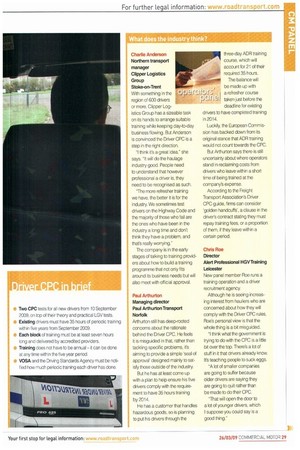Paul Arthurton Managing director Paul Arthurton Transport Norfolk Arthurton still
Page 29

If you've noticed an error in this article please click here to report it so we can fix it.
has deep-rooted concerns about the rationale behind the Driver CPC. He feels it is misguided in that, rather than tackling specific problems, it's aiming to provide a simple 'seal of approval' designed mainly to satisfy those outside of the industry.
But he has at least come up with a plan to help ensure his five drivers comply with the requirement to have 35 hours training by 2014.
He has a customer that handles hazardous goods, so is planning to put his drivers through the three-day ADR training course, which will account for 21 of their required 35 hours.
The balance wit be made up with a refresher course taken just before the deadline for existing drivers to have completed training in 2014.
Luckily, the European Commission has backed down from its original stance that ADR training would not count towards the CPC.
But Arthurton says there is still uncertainty about where operators stand in reclaiming costs from drivers who leave within a short time of being trained at the company's expense.
According to the Freight Transport Association's Driver CPC guide, firms can consider 'golden handcuffs', a clause in the driver's contract stating they must repay training fees, or a proportion of them, if they leave within a certain period.












































































































































